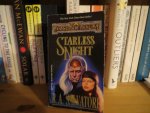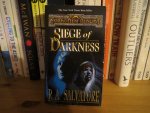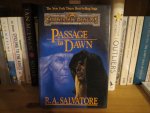#047 Starless Night by RA Salvatore (Legacy of the Drow 2)
Read 23/1/20 to 27/1/20

Book 2- and more of the same, and I have three observations to make- one bad, one good, and one... I'm just plain confused about.
So, to begin with the bad- here's the deal, we're post-Wulfgar (although I'm still not convinced- the Barbar's body has not yet been recovered, although his mighty magical hammer has) and our heroes are mostly down in the dumps (or worse). They're also of the opinion (or at least Drizzt is) that the Drow are coming! Which, as it turns out, is spot on- Lolth (via Matron Baenre et al) has a hard-on (if you'll excuse the term) from Drizzt, and also a desire to conquer Mithril Hall. So, bad things are coming- so what does Drizzt do, basically slopes off back to home sweet home (Menzoberranzan) to 'solve' the problem.
Hubris, a Messiah-complex, or just plain idiocy- you decide what brought Drizzt to this decision; the Dark Elf archetype thinks he's either going to 'solve' the problem (kill Matron Baenre/every Drow in Menzo/Lolth?) or die trying. Like they're the only possible options.
Drizzt, better than anyone else, knows what the Drow are like- it took me four seconds to work out that the most risky thing he could do was walk in to Menzoberranzan (with his head rammed full of useful knowledge about Mithrill Hall etc.) and in to the reach of his enemies. Actually about page 200 of the novel Drizzt (at last) reaches the same conclusion.
Then Catti finds out Drizzt is gone and repeats the formula- she's off to Menzo to save him.
By the way, remember those "Love is..." stickers/cartoons. Well, "Love is... heading to Menzoberranzan to rescue your not-boyfriend from the Evilest Underlords." True dat!
Also, what has he learned so far on the surface? Drizzt tells us (again and again) he likes long walks and nice sunsets, and trust (and friendship) and platonic love... but not enough of any of these last three to actually, y'know, talk with his friends. Friends that will do anything to help Drizzt, including risk their own lives- but no, I am Drizzt- Drow-wonderful, twin-scimitar-sword-wielding-deity, and I am an army of one. Hear me roar!
So, that's the bad- and there's a little more than that- why does he leave all the magic stuff that could help him with Regis, if only so that there's a way for Catti to go after him. Not only is he plunging in to terror but he's hamstringing himself before he departs- gah!
But, and this is my second point, it's great- fantastic in places, the Menzoberranzan Tourist Board have really got their work cut out, what a city it is- and the more time I spend there, and witness to the evil machinations of the unfriendly neighbourhood Drow, then the happier I am. Same with all of the good guys and the bad guys, special mention goes to Jarlaxle who just gets cooler and cooler as the novels/series develops. Entreri is also back in action- after surviving (miraculously, natch) from the last book- no body = not dead, I'm certain. The assassin even teams up with the good guys (Drizzt, Catti & Guen) for the final break-out and flee to the surface.
There's a ton of good stuff in here, a bit too much sword vs sword in places, but y'know- more of the same, well written, and a great story- some nice complications and twists, and... we're back at the beginning.
Great work.
Here's point three- and this one made me scratch my head every time I picked up the book, who the hell are the pair on the front cover?

Is Andre Rieu, a Drow?

The female Drow (or maybe not-Drow) is that Vendes? Catti as a Drow? Catti as Catti?
Don't you dare tell me that's Drizzt on the cover, don't you bloody dare.
I wont have it.
Read.
Read 23/1/20 to 27/1/20

Book 2- and more of the same, and I have three observations to make- one bad, one good, and one... I'm just plain confused about.
So, to begin with the bad- here's the deal, we're post-Wulfgar (although I'm still not convinced- the Barbar's body has not yet been recovered, although his mighty magical hammer has) and our heroes are mostly down in the dumps (or worse). They're also of the opinion (or at least Drizzt is) that the Drow are coming! Which, as it turns out, is spot on- Lolth (via Matron Baenre et al) has a hard-on (if you'll excuse the term) from Drizzt, and also a desire to conquer Mithril Hall. So, bad things are coming- so what does Drizzt do, basically slopes off back to home sweet home (Menzoberranzan) to 'solve' the problem.
Hubris, a Messiah-complex, or just plain idiocy- you decide what brought Drizzt to this decision; the Dark Elf archetype thinks he's either going to 'solve' the problem (kill Matron Baenre/every Drow in Menzo/Lolth?) or die trying. Like they're the only possible options.
Drizzt, better than anyone else, knows what the Drow are like- it took me four seconds to work out that the most risky thing he could do was walk in to Menzoberranzan (with his head rammed full of useful knowledge about Mithrill Hall etc.) and in to the reach of his enemies. Actually about page 200 of the novel Drizzt (at last) reaches the same conclusion.
Then Catti finds out Drizzt is gone and repeats the formula- she's off to Menzo to save him.
By the way, remember those "Love is..." stickers/cartoons. Well, "Love is... heading to Menzoberranzan to rescue your not-boyfriend from the Evilest Underlords." True dat!
Also, what has he learned so far on the surface? Drizzt tells us (again and again) he likes long walks and nice sunsets, and trust (and friendship) and platonic love... but not enough of any of these last three to actually, y'know, talk with his friends. Friends that will do anything to help Drizzt, including risk their own lives- but no, I am Drizzt- Drow-wonderful, twin-scimitar-sword-wielding-deity, and I am an army of one. Hear me roar!
So, that's the bad- and there's a little more than that- why does he leave all the magic stuff that could help him with Regis, if only so that there's a way for Catti to go after him. Not only is he plunging in to terror but he's hamstringing himself before he departs- gah!
But, and this is my second point, it's great- fantastic in places, the Menzoberranzan Tourist Board have really got their work cut out, what a city it is- and the more time I spend there, and witness to the evil machinations of the unfriendly neighbourhood Drow, then the happier I am. Same with all of the good guys and the bad guys, special mention goes to Jarlaxle who just gets cooler and cooler as the novels/series develops. Entreri is also back in action- after surviving (miraculously, natch) from the last book- no body = not dead, I'm certain. The assassin even teams up with the good guys (Drizzt, Catti & Guen) for the final break-out and flee to the surface.
There's a ton of good stuff in here, a bit too much sword vs sword in places, but y'know- more of the same, well written, and a great story- some nice complications and twists, and... we're back at the beginning.
Great work.
Here's point three- and this one made me scratch my head every time I picked up the book, who the hell are the pair on the front cover?
Is Andre Rieu, a Drow?
The female Drow (or maybe not-Drow) is that Vendes? Catti as a Drow? Catti as Catti?
Don't you dare tell me that's Drizzt on the cover, don't you bloody dare.
I wont have it.
Read.


